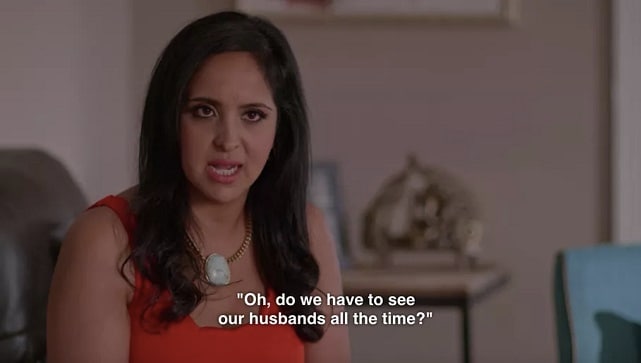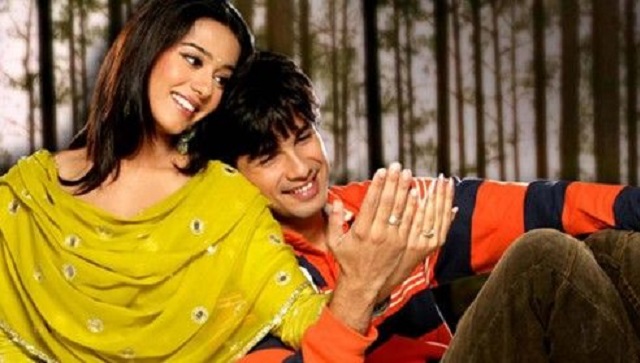In our column,
Through Her Looking Glass , we try to decode iconic films from a female perspective. The series will attempt to understand the agency each female character holds in the film’s narrative (mostly, from a contemporary standpoint) and whether the purported meaning of the film alters under such a viewing. ** I was 9 years old when Sooraj Barjatiya’s Vivah made its way to the silver screen. The idea of a young couple relishing their courtship period caught in the first throes of innocent, budding love, their geographical distance notwithstanding, would make me all giddy. Let me explain myself, I was 9; my film choices were limited to likes of Ta Ra Rum Pum, Taare Zameen Par. Years later at the age of 22, on a drunken night when I re-watched Vivah with my friends, it was nothing short of a giggle fest. While the decision to revisit the film that night was a joke, I soon realised that despite being built on the Barjatiya ethos of sanskaar, the film had its own flaws. Vivah was extremely outdated and regressive even for the year (2006) it was set in. Set against the plot of an arranged marriage, the film carries within sub-plots of colourism, questionable views on gender equality and consent. However, later this year, we were subjected to yet another chaotic mess with Netflix’s Indian Matchmaking, a reality show’s exploration of arranged marriage system. Be it Vivah or Indian Matchmaking, both took me back to the 70s, an era better left in the past. Both pieces try hard to propel the practice of an arranged marriage, something we millennials recognise as obsolete. I thought we had outgrown of the Barjatiya film template a long back. But the fact that Vivah still plays on Indian cable TV, and quite often at that, makes me nervous about its massive reach and impression on a new generation. *** Following its premiere in July, Netflix’s
_Indian Matchmaking_ dominated conversations, twitter threads and op-eds for several weeks. Created in the US, the series follows a Mumbai-based matchmaker Sima Taparia, who flies between India and the US, facilitating the tradition of an arranged marriage by finding suitable matches for her clients. Much like Sima Auntie, Barjatiya’s Vivah opens to a Bhagat Uncle (Manoj Joshi) who cheerfully storms into Krishnakant’s (Alok Nath) house with an ‘ucche ghar ka rishta’ for his niece, Poonam (Amrita Rao). She is everything that an Indian heterosexual male would want in his partner (so we are told, within the traditional constraints of Barjatya Universe ™) — religious, righteous, fair, servile, and educated (albeit negligible). Bhagat can’t stop emphasising on how Poonam has come of age because their ‘samaj’ (community) is abuzz with talks of her ‘beauty.’ The wealthy Delhi-based industrialist Harishchandra (Anupam Kher), who is keen on finding a wife for his second son Prem (Shahid Kapoor), hears of Poonam through their mutual acquaintance, Bhagat. A meeting is set at Krishnakant’s home in Madhupur. Introductions are done, chai is served, sweet boxes are exchanged, and the prospective couple is sent to terrace on the behest of ‘getting to know each other better’. While Prem opens up on his past, his crushes, his schooling, Poonam hardly utters a word. Only nods and whispers about her favourite religious books. Perhaps drawn to her innocence and simplicity, Prem agrees to the marriage. Everyone is happy, expect Poonam’s aunt, Rama (Seema Biswas), who is shown to be jealous of Poonam’s beauty and worried about running out on ‘good’ marriage prospects for her own dark-skinned daughter, Chotti. [caption id=“attachment_8876231” align=“alignnone” width=“641”] Shahid Kapoor and Amrita Rao in a still from Vivah | Twitter[/caption] Though arranged marriages may seem like a relic of a bygone age, they are still surprisingly popular around the world. The success of a regressive film like Vivah in 2006, and the uber-success of a show like Indian Matchmaking in 2020 is further proof of Indians’ fixation with matchmaking and arranged marriages. Vivah’s treatment of the entire shenanigan is saccharine sweet. It is difficult to relate to the squeaky-clean characters and overlook how the one-dimensional protagonists – Poonam and Prem – are both virtuous and morally decent. On the other hand, Indian Matchmaking dives deep into the arranged marriage system, holds a mirror to the archaic values and presents them on a glossy platter. Parental pressure, issues of compatibility, love vs. career, ageing and past relationships are a few recurring themes. Terms like ‘adjustment’, ‘compatibility’, ‘good nature’, ‘compromise’ and ‘traditional’ are thrown around in abundance. One particular desire that repeatedly comes up is for a “fair skin” match. This is an idea of beauty that can be
traced back to caste politics and a deeply archaic society where caste oppression is a daily reality. Though Vivah necessarily doesn’t endorse the beauty standards of lighter skin, it never really subverts from it either. Most of the well-to-do, attractive people that we’re supposed to sympathise and identify within Vivah (and in virtually every other Bollywood film) have lighter skin. The actress playing the supposedly plain Chhoti,
Amrita Prakash, has been blackfaced in most scenes to get across the colourism point. [caption id=“attachment_8876151” align=“alignnone” width=“640”]
Amrita Prakash (L), Amrita Rao (R) in a still from Vivah | Twitter[/caption] But while her mother obsesses over Chhoti’s looks—we see Rama applying powders, creams, and other treatments in a vain effort to make Chhoti’s skin lighter—Chhoti herself isn’t bothered in the least by her looks or lack of traditional femininity. She is smart and funny—when sent to serve food to the family’s guests, mocks her mother’s admonitions to “walk properly” with an exaggerated hip-sway—and seems perfectly comfortable in her own skin, despite her mother’s fixation on lightening it. *** In Vivah, when a reluctant Prem expresses that it may be too soon for him to settle down, his father recounts him the tales of his own marital bliss. Harishchandra throws in a variety of words picked out straight from Sima Auntie’s glossary – acceptance, adapt, trust. Yet to fall for this trope, when Prem brings up his career, Harishchandra takes a philosophical route. “Prem, every man needs an inspiration to achieve something in life. She will double your happiness and minus your sorrows,” he advises Prem as if personifying a happiness robot rather than a woman. Poonam is docile to a fault; she is not only extremely conservative but hardly embodies any agency. She sobs, she smiles, she scampers, she serves Jal, she prays — she does anything anyone wants her to do, making you wish someone shook her hard and asked to be less subtle. What Harishchandra and most men often forget that women are thinking living individuals, with their own anxieties, fears and sorrows, and it is rather cruel of men to treat them as a rehabilitation centre for their own pleasure.
When Akshay Jakhete was introduced on Indian Matchmaking, the self-proclaimed shy boy who’d never dated before seemed like he was getting forced into a marriage. In walked Mumbai’s top matchmaker Sima Auntie to save the day and Akshay’s mom entrusted her with the responsibility to find him a “flexible” girl. The Mumbai boy seemed to be confused about what he was looking for but when asked what his ideal girl would be like, he could only answer, “someone like my mom_._” Although he finally settled for a girl, he soon broke up with her, stating that he didn’t feel a connection. However, the funnest member of the show, who deserves a spinoff of her own, is Aparna Shewakramani. She’s the quintessential career woman who doesn’t have the time, energy, or inclination to focus on her love life. At one point, Sima Auntie implies that Aparna will never be able to find a match if she can’t compromise her standards and values. But the fact of the matter is, South Asian women are always criticised the moment they disagree with the majority of Indian culture and tradition. They are branded “difficult” or other such monikers because they don’t conform. [caption id=“attachment_8876161” align=“alignnone” width=“641”]  Aparna Shewakramani from Netflix’s Indian Matchmaking | Source: Netflix[/caption] Though both Vivah and Indian Matchmaking conclude with an idyllic montage of happy couples, it brings out the worst of colourism and classism that Indians have to offer. Nevertheless, as I continue to examine adulthood, I find that arranged marriage is a family-sanctioned form of social control—which sometimes diminishes an individual’s personal choice in favour of a community’s long-standing views.


)
)
)
)
)
)
)
)
)



